What is a hypothesis?
No. A hypothesis is sometimes described as an educated guess. That's not the same thing as a guess and not really a good description of a hypothesis either. Let's try working through an example.
If you put an ice cube on a plate and place it on the table, what will happen? A very young child might guess that it will still be there in a couple of hours. Most people would agree with the hypothesis that:
An ice cube will melt in less than 30 minutes.
You could put sit and watch the ice cube melt and think you've proved a hypothesis. But you will have missed some important steps.
For a good science fair project you need to do quite a bit of research before any experimenting. Start by finding some information about how and why water melts. You could read a book, do a bit of Google searching, or even ask an expert. For our example, you could learn about how temperature and air pressure can change the state of water. Don't forget that elevation above sea level changes air pressure too.
Now, using all your research, try to restate that hypothesis.
An ice cube will melt in less than 30 minutes in a room at sea level with a temperature of 20C or 68F.
But wait a minute. What is the ice made from? What if the ice cube was made from salt water, or you sprinkled salt on a regular ice cube? Time for some more research. Would adding salt make a difference? Turns out it does. Would other chemicals change the melting time?
Using this new information, let's try that hypothesis again.
An ice cube made with tap water will melt in less than 30 minutes in a room at sea level with a temperature of 20C or 68F.
Does that seem like an educated guess? No, it sounds like you are stating the obvious.
At this point, it is obvious only because of your research. You haven't actually done the experiment. Now it's time to run the experiment to support the hypothesis.
A hypothesis isn't an educated guess. It is a tentative explanation for an observation, phenomenon, or scientific problem that can be tested by further investigation.
Once you do the experiment and find out if it supports the hypothesis, it becomes part of scientific theory.
Notes to Parents:
- Every parent must use their own judgment in choosing which activities are safe for their own children. While Science Kids at Home makes every effort to provide activity ideas that are safe and fun for children it is your responsibility to choose the activities that are safe in your own home.
- Science Kids at Home has checked the external web links on this page that we created. We believe these links provide interesting information that is appropriate for kids. However, the internet is a constantly changing place and these links may not work or the external web site may have changed. We also have no control over the "Ads by Google" links, but these should be related to kids science and crafts. You are responsible for supervising your own children. If you ever find a link that you feel is inappropriate, please let us know.
Kids Science Gifts Science Experiments Science Fair Projects Science Topics Creative Kids Blog
Kids Crafts Privacy Policy Copyright © 2016 Science Kids at Home, all rights reserved.

What is a scientific hypothesis?
It's the initial building block in the scientific method.

Hypothesis basics
What makes a hypothesis testable.
- Types of hypotheses
- Hypothesis versus theory
Additional resources
Bibliography.
A scientific hypothesis is a tentative, testable explanation for a phenomenon in the natural world. It's the initial building block in the scientific method . Many describe it as an "educated guess" based on prior knowledge and observation. While this is true, a hypothesis is more informed than a guess. While an "educated guess" suggests a random prediction based on a person's expertise, developing a hypothesis requires active observation and background research.
The basic idea of a hypothesis is that there is no predetermined outcome. For a solution to be termed a scientific hypothesis, it has to be an idea that can be supported or refuted through carefully crafted experimentation or observation. This concept, called falsifiability and testability, was advanced in the mid-20th century by Austrian-British philosopher Karl Popper in his famous book "The Logic of Scientific Discovery" (Routledge, 1959).
A key function of a hypothesis is to derive predictions about the results of future experiments and then perform those experiments to see whether they support the predictions.
A hypothesis is usually written in the form of an if-then statement, which gives a possibility (if) and explains what may happen because of the possibility (then). The statement could also include "may," according to California State University, Bakersfield .
Here are some examples of hypothesis statements:
- If garlic repels fleas, then a dog that is given garlic every day will not get fleas.
- If sugar causes cavities, then people who eat a lot of candy may be more prone to cavities.
- If ultraviolet light can damage the eyes, then maybe this light can cause blindness.
A useful hypothesis should be testable and falsifiable. That means that it should be possible to prove it wrong. A theory that can't be proved wrong is nonscientific, according to Karl Popper's 1963 book " Conjectures and Refutations ."
An example of an untestable statement is, "Dogs are better than cats." That's because the definition of "better" is vague and subjective. However, an untestable statement can be reworded to make it testable. For example, the previous statement could be changed to this: "Owning a dog is associated with higher levels of physical fitness than owning a cat." With this statement, the researcher can take measures of physical fitness from dog and cat owners and compare the two.
Types of scientific hypotheses

In an experiment, researchers generally state their hypotheses in two ways. The null hypothesis predicts that there will be no relationship between the variables tested, or no difference between the experimental groups. The alternative hypothesis predicts the opposite: that there will be a difference between the experimental groups. This is usually the hypothesis scientists are most interested in, according to the University of Miami .
For example, a null hypothesis might state, "There will be no difference in the rate of muscle growth between people who take a protein supplement and people who don't." The alternative hypothesis would state, "There will be a difference in the rate of muscle growth between people who take a protein supplement and people who don't."
If the results of the experiment show a relationship between the variables, then the null hypothesis has been rejected in favor of the alternative hypothesis, according to the book " Research Methods in Psychology " (BCcampus, 2015).
There are other ways to describe an alternative hypothesis. The alternative hypothesis above does not specify a direction of the effect, only that there will be a difference between the two groups. That type of prediction is called a two-tailed hypothesis. If a hypothesis specifies a certain direction — for example, that people who take a protein supplement will gain more muscle than people who don't — it is called a one-tailed hypothesis, according to William M. K. Trochim , a professor of Policy Analysis and Management at Cornell University.
Sometimes, errors take place during an experiment. These errors can happen in one of two ways. A type I error is when the null hypothesis is rejected when it is true. This is also known as a false positive. A type II error occurs when the null hypothesis is not rejected when it is false. This is also known as a false negative, according to the University of California, Berkeley .
A hypothesis can be rejected or modified, but it can never be proved correct 100% of the time. For example, a scientist can form a hypothesis stating that if a certain type of tomato has a gene for red pigment, that type of tomato will be red. During research, the scientist then finds that each tomato of this type is red. Though the findings confirm the hypothesis, there may be a tomato of that type somewhere in the world that isn't red. Thus, the hypothesis is true, but it may not be true 100% of the time.
Scientific theory vs. scientific hypothesis
The best hypotheses are simple. They deal with a relatively narrow set of phenomena. But theories are broader; they generally combine multiple hypotheses into a general explanation for a wide range of phenomena, according to the University of California, Berkeley . For example, a hypothesis might state, "If animals adapt to suit their environments, then birds that live on islands with lots of seeds to eat will have differently shaped beaks than birds that live on islands with lots of insects to eat." After testing many hypotheses like these, Charles Darwin formulated an overarching theory: the theory of evolution by natural selection.
"Theories are the ways that we make sense of what we observe in the natural world," Tanner said. "Theories are structures of ideas that explain and interpret facts."
- Read more about writing a hypothesis, from the American Medical Writers Association.
- Find out why a hypothesis isn't always necessary in science, from The American Biology Teacher.
- Learn about null and alternative hypotheses, from Prof. Essa on YouTube .
Encyclopedia Britannica. Scientific Hypothesis. Jan. 13, 2022. https://www.britannica.com/science/scientific-hypothesis
Karl Popper, "The Logic of Scientific Discovery," Routledge, 1959.
California State University, Bakersfield, "Formatting a testable hypothesis." https://www.csub.edu/~ddodenhoff/Bio100/Bio100sp04/formattingahypothesis.htm
Karl Popper, "Conjectures and Refutations," Routledge, 1963.
Price, P., Jhangiani, R., & Chiang, I., "Research Methods of Psychology — 2nd Canadian Edition," BCcampus, 2015.
University of Miami, "The Scientific Method" http://www.bio.miami.edu/dana/161/evolution/161app1_scimethod.pdf
William M.K. Trochim, "Research Methods Knowledge Base," https://conjointly.com/kb/hypotheses-explained/
University of California, Berkeley, "Multiple Hypothesis Testing and False Discovery Rate" https://www.stat.berkeley.edu/~hhuang/STAT141/Lecture-FDR.pdf
University of California, Berkeley, "Science at multiple levels" https://undsci.berkeley.edu/article/0_0_0/howscienceworks_19
Sign up for the Live Science daily newsletter now
Get the world’s most fascinating discoveries delivered straight to your inbox.

Siberia's 'gateway to the underworld' is growing a staggering amount each year
Earth from space: Mysterious wave ripples across 'galaxy' of icebergs in Arctic fjord
Iron Age necropolis that predates Rome unearthed near Naples
Most Popular
- 2 'It would be within its natural right to harm us to protect itself': How humans could be mistreating AI right now without even knowing it
- 3 Key events in the Bible, such as the settlement and destruction of Jerusalem, confirmed using radiocarbon dating
- 4 Asteroid that exploded over Berlin was fastest-spinning space rock ever recorded
- 5 Cave of Crystals: The deadly cavern in Mexico dubbed 'the Sistine Chapel of crystals'
- 2 Cave of Crystals: The deadly cavern in Mexico dubbed 'the Sistine Chapel of crystals'
- 3 Why do dogs sniff each other's butts?
- 4 Antarctic ice hole the size of Switzerland keeps cracking open. Now scientists finally know why.
- 5 'It would be within its natural right to harm us to protect itself': How humans could be mistreating AI right now without even knowing it
Get Your ALL ACCESS Shop Pass here →
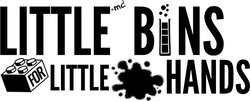
Scientific Method For Kids With Examples
Kids have questions about the world around them every day, and there is so much to learn through experimentation with simple materials. You can begin using the scientific method with elementary kids. Below we’ll share with you how and when to introduce the scientific method, the steps of the scientific method, and some easy scientific method experiments. There are so many great ways to enjoy science projects with kids!
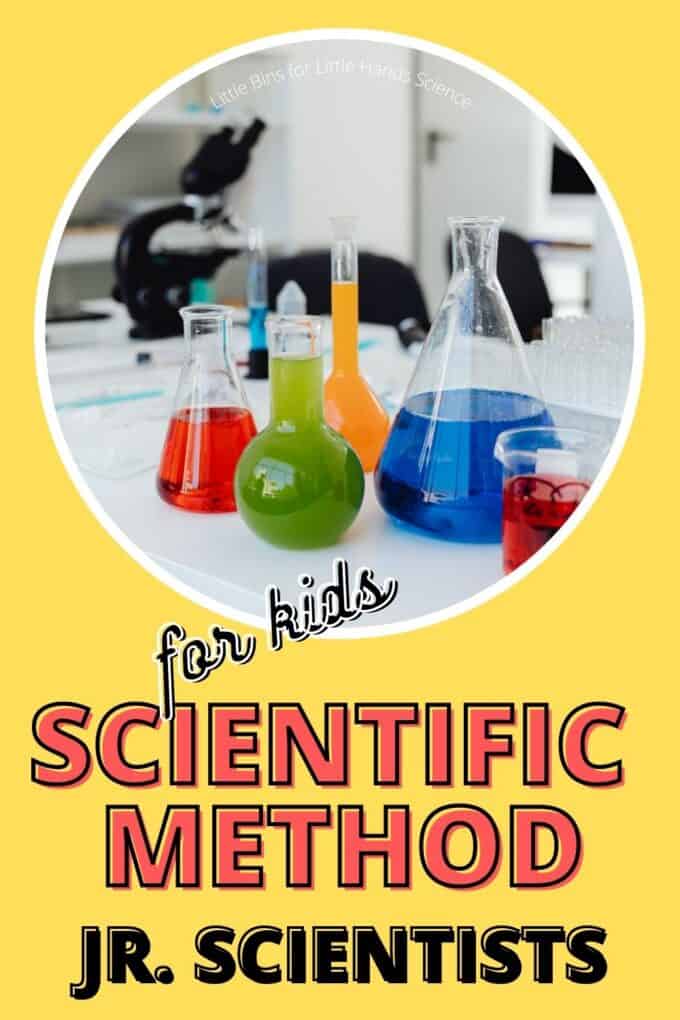
What Is The Scientific Method?
The scientific method is a process or method of research. A problem is identified, information about the problem is gathered, a hypothesis or question is formulated from the information, and the hypothesis is put to the test with an experiment to prove or disprove its validity.
Sounds heavy… What in the world does that mean?!? It means you don’t need to try and solve the world’s biggest science questions! The scientific method is all about studying and learning things right around you.
As children develop practices that involve creating, gathering data evaluating, analyzing, and communicating, they can apply these critical thinking skills to any situation.
Note: The use of the best Science and Engineering Practices is also relevant to the topic of using the scientific method. Read more here and see if it fits your science planning needs.
Can Young Kids Use the Scientific Method?
Kids are great scientists at any age, and can use the scientific method in context to what they are learning. It can be adapted for any age!
The scientific method is a valuable tool for introducing kids to a logical way to solve scientific problems. Scientists use the scientific method to study, learn, and come up with an answer!
The scientific method is a process that helps double-check that answers are correct and the correct results are obtained through careful planning. Sometimes the guesses and questions change as you run your experiments.
Kids can use the scientific method too on questions that are relevant to them!
Let’s break the scientific method for kids down into six parts, and you can quickly see how each can be incorporated into your next science experiment.
What Are The Steps In The Scientific Method?
- Make initial observations.
- Come up with a question of interest that is based on the observations.
- Develop a hypothesis or prediction to go along with the question.
- Experiment and test.
- Gather and record results of tests and experiments and draw conclusions.
- Share and discuss results.
Whoa… Wait A Minute! That sounds like a lot for a young kid!
You are correct. Depending on your kid’s abilities, following all the scientific method steps precisely will not go well. Someone will get frustrated, bored, and turned off by just how cool science can be. We do not want that to happen!
Using The Scientific Method For Preschool and Kindergarten
Use the scientific method steps as a guideline in the back of your mind. You can cover most of the steps by talking with your kids about…
- What do they think will happen?
- What is happening ?
- What happened compared to what they thought would happen ?
No writing is required! It’s also best to pick pretty straightforward ideas that aren’t overly involved or complicated to set up and test. Kids always have burning questions and “what ifs.”
See if you can tackle their next “what if” using the scientific method by listening carefully to their conversations. You can even have them keep a journal with their “what if” questions for your next science time.
Learn more about Science Activities For Preschoolers and Kindergarten Science Experiments .
Now on to how to apply the scientific method for elementary kiddos and beyond.
Scientific Method Steps In Action
Learn more about the steps of the scientific method below, which are great for science at home with your kids or in the classroom! We have also included some simple scientific method experiments for you to enjoy.
Ice Science Experiments are perfect for this! Try these 3 today !
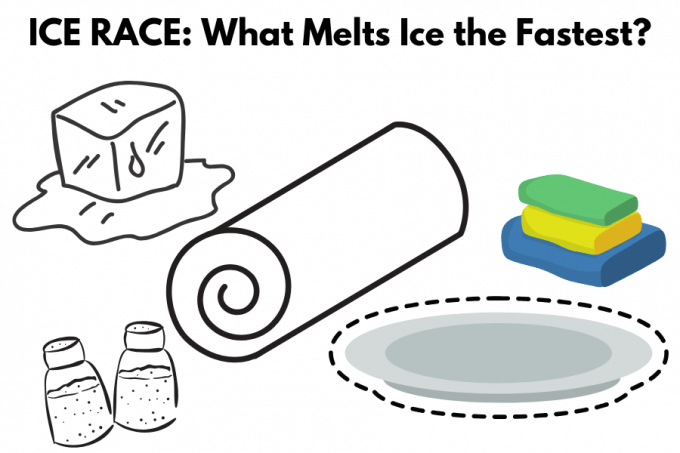
STEP 1: Make Observations
Tons of everyday activities would make for cool science experiments using the scientific method. Listen to what your kids talk about and see happening. My son noticed that ice melted pretty fast in his water.
Observation is simply noticing what’s happening through our senses or with tools like a magnifying glass. Observation is used to collect and record data, enabling scientists to construct and test hypotheses and theories.
Learn more about observations in science.
STEP 2: Come Up With A Question
Your kids’ observations should lead to some sort of question. For my son and his ice observations, he came up with questions. Does ice melt faster in different liquids? His curiosity about what happens to the ice in liquids is a simple science experiment perfect for using the scientific method.
Next! Do some research and come up with ideas!
STEP 3: Develop A Prediction or Hypothesis
You have made your observations, you have your question, and now you need to make a prediction about what you think will happen.
A prediction is a guess at what might happen in an experiment based on observation or other information.
A hypothesis is not simply a guess! It’s a statement of what you believe will happen based on the information you have gathered.
My son hypothesizes that ice will melt faster in juice than in water.
STEP 4: Conduct An Experiment
We made a prediction that ice will melt faster in juice than it will in water, and now we have to test our hypothesis. We set up an experiment with a glass of juice, a glass of water, and an ice cube for each.
For the best experiments, only one thing should change! All the things that can be changed in a science experiment are called variables. There are three types of variables; independent, dependent, and controlled.
The independent variable is the one that is changed in the experiment and will affect the dependent variable. Here we will use different types of liquids to melt our ice cube in.
The dependent variable is the factor that is observed or measured in the experiment. This will be the melting of the ice cubes. Set up a stopwatch or set a time limit to observe the changes!
The controlled variable stays constant in the experiment. The liquids should be roughly the same temperature (as close as possible) for our ice melting experiment and measured to the same amount. So we left them out to come to room temperature. They could also be tested right out of the fridge!
You can find simple science experiments here with dependent and controlled variables.
STEP 5: Record Results and Draw Conclusions
Make sure to record what is happening as well as the results—note changes at specific time intervals or after one set time interval.
For example…
- Record when each ice cube is completely melted.
- Add drawings if you wish of the setup up and the end results.
- Was your prediction accurate? If it was inaccurate, record why.
- Write out a final conclusion to your experiment.
STEP 6: Communicate Your Results
This is the opportunity to talk about your hypothesis, experiment, results, and conclusion!
ALTERNATIVE IDEAS: Switch out an ice cube for a lollipop or change the liquids using vinegar and cooking oil.
Now you have gone through the steps of the scientific method, read on for more fun scientific method experiments to try!
Free printable scientific method worksheets!
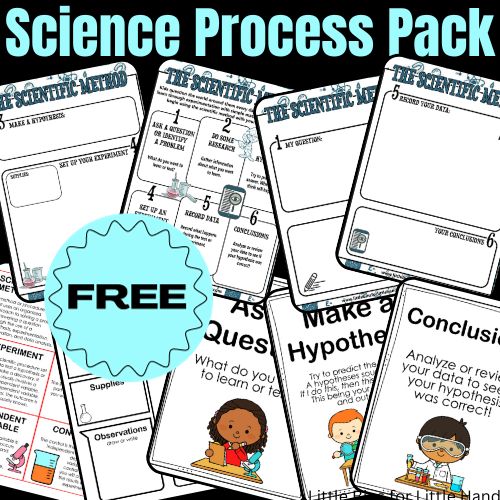
Fun Scientific Method Experiments
Sink or float experiment.
A Sink or Float experiment is great for practicing the steps of the scientific method with younger kids.
Grab this FREE printable sink or float experiment
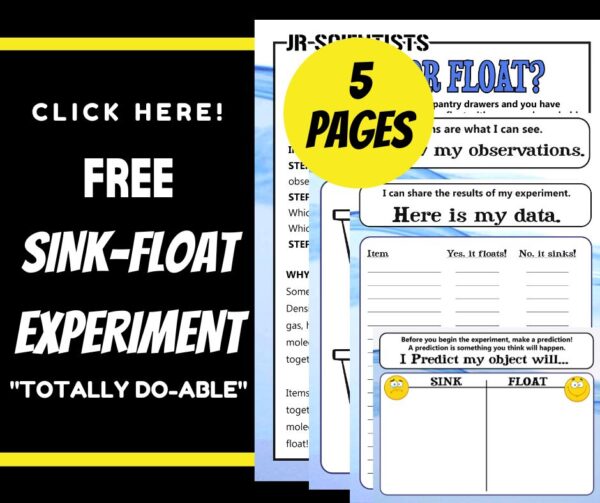
Here are a few of our favorite scientific method experiments, which are great for elementary-age kids . Of course, you can find tons more awesome and doable science projects for kids here!
Magic Milk Experiment
Start with demonstrating this delightful magic milk experiment. Then get kids to apply the steps of the scientific method by coming up with a question to investigate. What happens when you change the type of milk used?
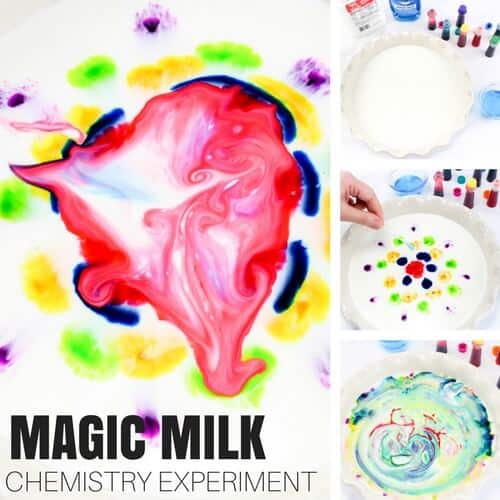
What Dissolves In Water
Investigate what solids dissolve in water and what do not. Here’s a super fun science experiment for kids that’s very easy to set up! Learn about solutions, solutes, and solvents through experimenting with water and common kitchen ingredients.
Apple Browning Experiment
Investigate how to keep apples from turning brown with this apple oxidation experiment . What can you add to cut apples to stop or slow the oxidation process?
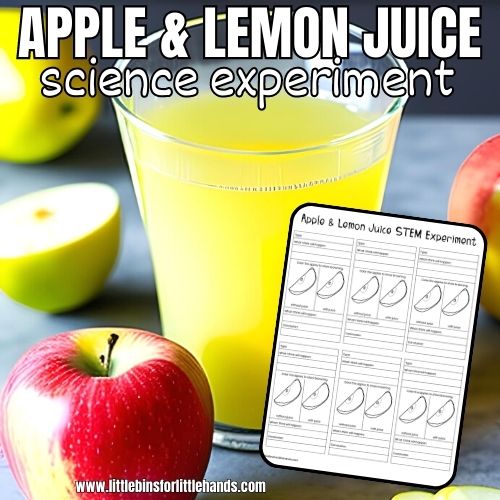
Freezing Water Experiment
Will it freeze? What happens to the freezing point of water when you add salt?
Viscosity Experiment
Learn about the viscosity of fluids with a simple viscosity experiment . Grab some marbles and add them to different household liquids to find out which one will fall to the bottom first.
Seed Germination Experiment
Set up a simple seed germination experiment .
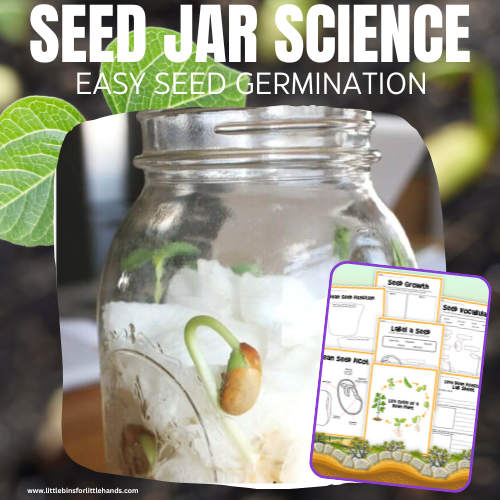
Catapult Experiment
Make a simple popsicle stick catapult and use one of our experiment ideas to investigate from rubber band tension to changes in launch angle and more. How far can you fling your objects? Take measurements and find out.
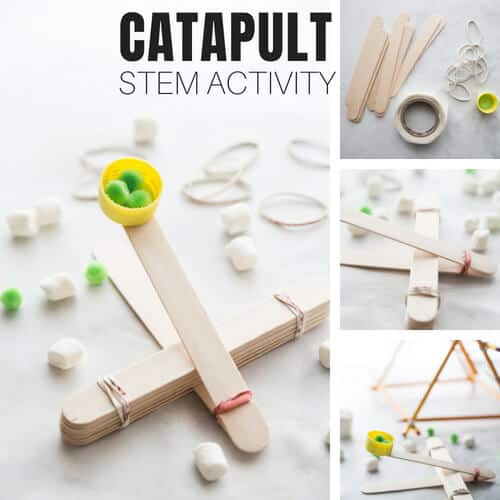
Floating Orange
Investigate whether an orange floats or sinks in water, and what happens if you use different types of oranges. Learn about buoyancy and density with a simple ingredient from the kitchen, an orange.
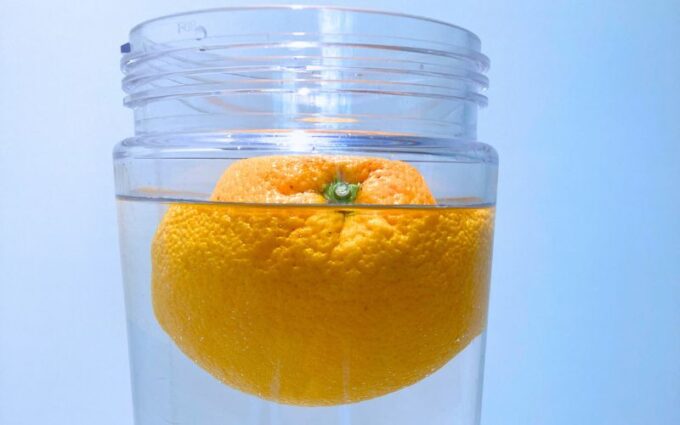
Bread Mold Experiment
Grow mold on bread for science, and investigate how factors such as moisture, temperature, and air affect mold growth.
Eggshell Strength Experiment
Test how strong an egg is with this eggshell strength experiment . Grab some eggs, and find out how much weight an egg can support.
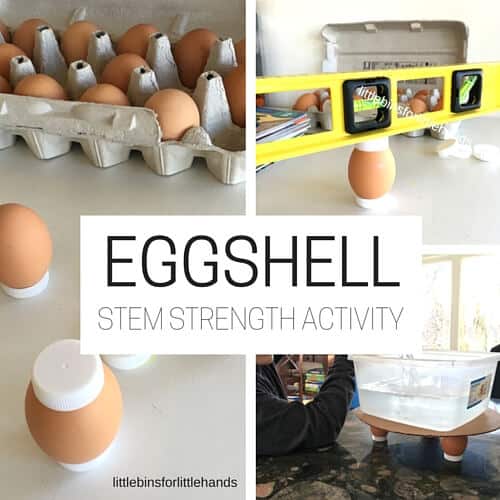
Free Printable Science Fair Starter Guide
Are you looking to plan a science fair project, make a science fair board, or want an easy guide to set up science experiments?
Learn more about prepping for a science fair and grab this free printable science fair project pack here!
If you want a variety of science fair experiments with instructions, make sure to pick up a copy of our Science Project Pack in the shop.
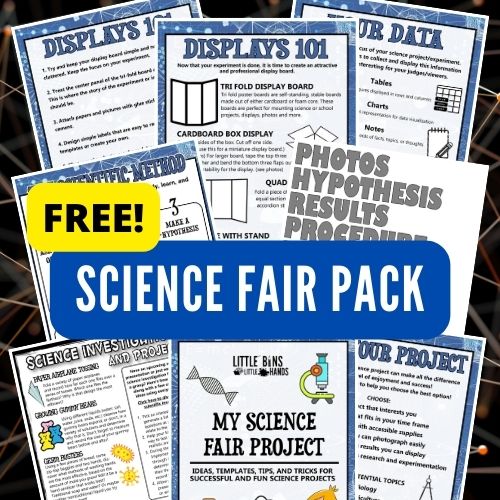
Bonus STEM Projects For Kids
STEM activities include science, technology, engineering, and mathematics. As well as our kids science experiments, we have lots of fun STEM activities for you to try. Check out these STEM ideas below…
- Building Activities
- Engineering Projects For Kids
- What Is Engineering For Kids?
- Coding Activities For Kids
- STEM Worksheets
- Top 10 STEM Challenges For Kids
Printable Science Projects Pack
If you’re looking to grab all of our printable science projects in one convenient place plus exclusive worksheets and bonuses like a STEAM Project pack, our Science Project Pack is what you need! Over 300+ Pages!
- 90+ classic science activities with journal pages, supply lists, set up and process, and science information. NEW! Activity-specific observation pages!
- Best science practices posters and our original science method process folders for extra alternatives!
- Be a Collector activities pack introduces kids to the world of making collections through the eyes of a scientist. What will they collect first?
- Know the Words Science vocabulary pack includes flashcards, crosswords, and word searches that illuminate keywords in the experiments!
- My science journal writing prompts explore what it means to be a scientist!!
- Bonus STEAM Project Pack: Art meets science with doable projects!
- Bonus Quick Grab Packs for Biology, Earth Science, Chemistry, and Physics
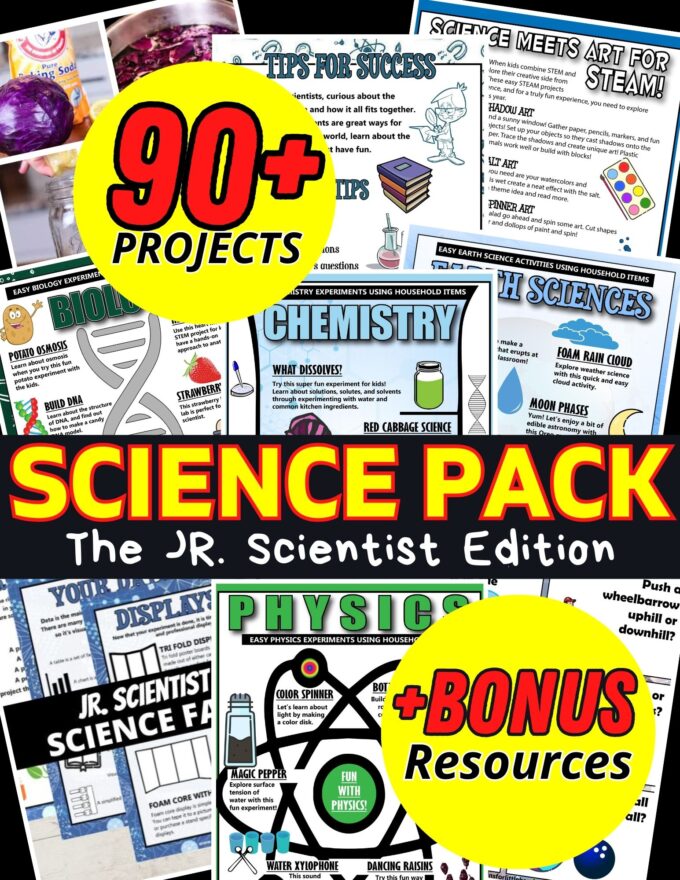
19 Comments
A great post and sure to help extend children’s thinking! I would like to download the 6 steps but the blue download button doesn’t seem to be working for me.
Thank you! All fixed. You should be able to download now!
- Pingback: Popsicle Stick Catapult Ideas for Kids STEM Activity
- Pingback: Magical Dancing Corn Thanksgiving Science Experiment
- Pingback: Shadow Science Physics Activity With Animal Puppets (FREE Printable)
- Pingback: Books to inspire your young scientists! – Mom Read It
- Pingback: Seed Jar Science Experiment for Spring STEM Activities with Kids
- Pingback: Magic Milk Classic Science Experiment Kids Science
- Pingback: Earth Day Science Activity and Homemade Liquid Density Lava Lamp
- Pingback: Dissolving Candy Hearts Science Experiment for Valentine's Day
- Pingback: Seashells With Vinegar Ocean Experiment | Little Bins for Little Hands
- Pingback: DIY Snow Globe For Kids | Little Bins for Little Hands
- Pingback: Science Project Ideas with Usable Tips From a Teacher!
- Pingback: Drops Of Water On A Penny | Little Bins for Little Hands
- Pingback: The BEST Very Simple Science Experiments for Kids to Try Anywhere
it is so great, thanks a lot.
This helped for a science project.Thanks so much.
Comments are closed.
~ Projects to Try Now! ~
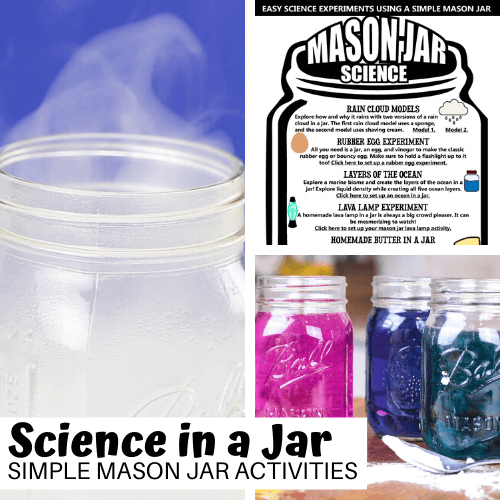
- More from M-W
- To save this word, you'll need to log in. Log In
Definition of hypothesis
Did you know.
The Difference Between Hypothesis and Theory
A hypothesis is an assumption, an idea that is proposed for the sake of argument so that it can be tested to see if it might be true.
In the scientific method, the hypothesis is constructed before any applicable research has been done, apart from a basic background review. You ask a question, read up on what has been studied before, and then form a hypothesis.
A hypothesis is usually tentative; it's an assumption or suggestion made strictly for the objective of being tested.
A theory , in contrast, is a principle that has been formed as an attempt to explain things that have already been substantiated by data. It is used in the names of a number of principles accepted in the scientific community, such as the Big Bang Theory . Because of the rigors of experimentation and control, it is understood to be more likely to be true than a hypothesis is.
In non-scientific use, however, hypothesis and theory are often used interchangeably to mean simply an idea, speculation, or hunch, with theory being the more common choice.
Since this casual use does away with the distinctions upheld by the scientific community, hypothesis and theory are prone to being wrongly interpreted even when they are encountered in scientific contexts—or at least, contexts that allude to scientific study without making the critical distinction that scientists employ when weighing hypotheses and theories.
The most common occurrence is when theory is interpreted—and sometimes even gleefully seized upon—to mean something having less truth value than other scientific principles. (The word law applies to principles so firmly established that they are almost never questioned, such as the law of gravity.)
This mistake is one of projection: since we use theory in general to mean something lightly speculated, then it's implied that scientists must be talking about the same level of uncertainty when they use theory to refer to their well-tested and reasoned principles.
The distinction has come to the forefront particularly on occasions when the content of science curricula in schools has been challenged—notably, when a school board in Georgia put stickers on textbooks stating that evolution was "a theory, not a fact, regarding the origin of living things." As Kenneth R. Miller, a cell biologist at Brown University, has said , a theory "doesn’t mean a hunch or a guess. A theory is a system of explanations that ties together a whole bunch of facts. It not only explains those facts, but predicts what you ought to find from other observations and experiments.”
While theories are never completely infallible, they form the basis of scientific reasoning because, as Miller said "to the best of our ability, we’ve tested them, and they’ve held up."
- proposition
- supposition
hypothesis , theory , law mean a formula derived by inference from scientific data that explains a principle operating in nature.
hypothesis implies insufficient evidence to provide more than a tentative explanation.
theory implies a greater range of evidence and greater likelihood of truth.
law implies a statement of order and relation in nature that has been found to be invariable under the same conditions.
Examples of hypothesis in a Sentence
These examples are programmatically compiled from various online sources to illustrate current usage of the word 'hypothesis.' Any opinions expressed in the examples do not represent those of Merriam-Webster or its editors. Send us feedback about these examples.
Word History
Greek, from hypotithenai to put under, suppose, from hypo- + tithenai to put — more at do
1641, in the meaning defined at sense 1a
Phrases Containing hypothesis
- counter - hypothesis
- nebular hypothesis
- null hypothesis
- planetesimal hypothesis
- Whorfian hypothesis
Articles Related to hypothesis

This is the Difference Between a...
This is the Difference Between a Hypothesis and a Theory
In scientific reasoning, they're two completely different things
Dictionary Entries Near hypothesis
hypothermia
hypothesize
Cite this Entry
“Hypothesis.” Merriam-Webster.com Dictionary , Merriam-Webster, https://www.merriam-webster.com/dictionary/hypothesis. Accessed 7 May. 2024.
Kids Definition
Kids definition of hypothesis, medical definition, medical definition of hypothesis, more from merriam-webster on hypothesis.
Nglish: Translation of hypothesis for Spanish Speakers
Britannica English: Translation of hypothesis for Arabic Speakers
Britannica.com: Encyclopedia article about hypothesis
Subscribe to America's largest dictionary and get thousands more definitions and advanced search—ad free!

Can you solve 4 words at once?
Word of the day, extemporize.
See Definitions and Examples »
Get Word of the Day daily email!
Popular in Grammar & Usage
More commonly misspelled words, your vs. you're: how to use them correctly, every letter is silent, sometimes: a-z list of examples, more commonly mispronounced words, how to use em dashes (—), en dashes (–) , and hyphens (-), popular in wordplay, 12 star wars words, the words of the week - may 3, a great big list of bread words, 10 scrabble words without any vowels, 8 uncommon words related to love, games & quizzes.

Homeschool Science for Kids
Science designed for your homeschool family
Hypothesis: A Science Process Skill
January 25, 2021 By Janice VanCleave
A Hypothesis is a Well Thoughtout Prediction.
Yes, asking groups of kids to guess what will happen can be fun. But, expecting a hypothesis for every experiment defeats the purpose for this science process skill. A hypothesis relys on observations that have been previously made. Hypothesis are often called “educated” guesses. Please don’t require kids to give a hypothesis unless it can be based on previous knowledge. In other words, a hypothesis must be based on schema , which is previously learned information.
Using an Exploratory Experiment to provide needed schema for a hypothesis.
Research is any method used to learn more about a topic. Reading books, magazines as well as online sources and everyday observations of the world around you are good research methods. I suggest that research include exploratory experiments, such as those found in the science book shown. The following exploratory experiment was taken from , “201 Awesome, Magical, Bizarre & Incredible Experiments.” My intention in writing this and other experiment books was to provide fun experiments requiring around the house materials or materials easily found locally. These are exploratory experiments.
FYI: My books are sold on Amazon as well as other online books suppliers. If you sell my books contact me and I will add a link to your website.

Facts: Provide information that kids may not be familiar with before introducing the experiment.
- Pressure is the force pressing against a surface.
- Gas molecules move in a straight line until they collide with each other or their container. When colliding, the gas molecules, much like balls striking a wall changes direction and continues moving. Unlike a ball, each gas molecule collides, changes direction and continue at the same speed as before its collision.
Exploratory Experiment #141 Increasing
Problem: How does temperature affect air pressure? Materials: empty glass soda bottle (any glass bottle with a small mouth) 9-inch (23-cm) round balloon
Something More
Now that kids are engaged –have their schema turned on– introduce a problem related to the previous exploratory experiment.
4. Observe and record the appearance of the balloon over the bottle.
5. Place the open bottle and the bottle with the balloon in a freezer for 15 or more minutes. Note: You can sit the bottles in an ice chest with ice. Make sure both bottles are equally cooled and the chest is closed. Again, it is important for the air surrounding the bottles to be cold.
Share this:

Related posts:
- Science Process Skill: Identifying Variables
- How Salt Melts Ice
- Developing A Science Fair Project
- Coloring Changing Colorants
- Tutorial for Using Science Process Skills
- CAT Stickers
- Heat Energy
- Science Project Question
- Water Movement Through Xylem
- Forces: Balloon Rocket

What is Hypothesis? Definition, Meaning, Characteristics, Sources
- Post last modified: 10 January 2022
- Reading time: 18 mins read
- Post category: Research Methodology

What is Hypothesis?
Hypothesis is a prediction of the outcome of a study. Hypotheses are drawn from theories and research questions or from direct observations. In fact, a research problem can be formulated as a hypothesis. To test the hypothesis we need to formulate it in terms that can actually be analysed with statistical tools.
As an example, if we want to explore whether using a specific teaching method at school will result in better school marks (research question), the hypothesis could be that the mean school marks of students being taught with that specific teaching method will be higher than of those being taught using other methods.
In this example, we stated a hypothesis about the expected differences between groups. Other hypotheses may refer to correlations between variables.
Table of Content
- 1 What is Hypothesis?
- 2 Hypothesis Definition
- 3 Meaning of Hypothesis
- 4.1 Conceptual Clarity
- 4.2 Need of empirical referents
- 4.3 Hypothesis should be specific
- 4.4 Hypothesis should be within the ambit of the available research techniques
- 4.5 Hypothesis should be consistent with the theory
- 4.6 Hypothesis should be concerned with observable facts and empirical events
- 4.7 Hypothesis should be simple
- 5.1 Observation
- 5.2 Analogies
- 5.4 State of Knowledge
- 5.5 Culture
- 5.6 Continuity of Research
- 6.1 Null Hypothesis
- 6.2 Alternative Hypothesis
Thus, to formulate a hypothesis, we need to refer to the descriptive statistics (such as the mean final marks), and specify a set of conditions about these statistics (such as a difference between the means, or in a different example, a positive or negative correlation). The hypothesis we formulate applies to the population of interest.
The null hypothesis makes a statement that no difference exists (see Pyrczak, 1995, pp. 75-84).
Hypothesis Definition
A hypothesis is ‘a guess or supposition as to the existence of some fact or law which will serve to explain a connection of facts already known to exist.’ – J. E. Creighton & H. R. Smart
Hypothesis is ‘a proposition not known to be definitely true or false, examined for the sake of determining the consequences which would follow from its truth.’ – Max Black
Hypothesis is ‘a proposition which can be put to a test to determine validity and is useful for further research.’ – W. J. Goode and P. K. Hatt
A hypothesis is a proposition, condition or principle which is assumed, perhaps without belief, in order to draw out its logical consequences and by this method to test its accord with facts which are known or may be determined. – Webster’s New International Dictionary of the English Language (1956)
Meaning of Hypothesis
From the above mentioned definitions of hypothesis, its meaning can be explained in the following ways.
- At the primary level, a hypothesis is the possible and probable explanation of the sequence of happenings or data.
- Sometimes, hypothesis may emerge from an imagination, common sense or a sudden event.
- Hypothesis can be a probable answer to the research problem undertaken for study. 4. Hypothesis may not always be true. It can get disproven. In other words, hypothesis need not always be a true proposition.
- Hypothesis, in a sense, is an attempt to present the interrelations that exist in the available data or information.
- Hypothesis is not an individual opinion or community thought. Instead, it is a philosophical means which is to be used for research purpose. Hypothesis is not to be considered as the ultimate objective; rather it is to be taken as the means of explaining scientifically the prevailing situation.
The concept of hypothesis can further be explained with the help of some examples. Lord Keynes, in his theory of national income determination, made a hypothesis about the consumption function. He stated that the consumption expenditure of an individual or an economy as a whole is dependent on the level of income and changes in a certain proportion.
Later, this proposition was proved in the statistical research carried out by Prof. Simon Kuznets. Matthus, while studying the population, formulated a hypothesis that population increases faster than the supply of food grains. Population studies of several countries revealed that this hypothesis is true.
Validation of the Malthus’ hypothesis turned it into a theory and when it was tested in many other countries it became the famous Malthus’ Law of Population. It thus emerges that when a hypothesis is tested and proven, it becomes a theory. The theory, when found true in different times and at different places, becomes the law. Having understood the concept of hypothesis, few hypotheses can be formulated in the areas of commerce and economics.
- Population growth moderates with the rise in per capita income.
- Sales growth is positively linked with the availability of credit.
- Commerce education increases the employability of the graduate students.
- High rates of direct taxes prompt people to evade taxes.
- Good working conditions improve the productivity of employees.
- Advertising is the most effecting way of promoting sales than any other scheme.
- Higher Debt-Equity Ratio increases the probability of insolvency.
- Economic reforms in India have made the public sector banks more efficient and competent.
- Foreign direct investment in India has moved in those sectors which offer higher rate of profit.
- There is no significant association between credit rating and investment of fund.
Characteristics of Hypothesis
Not all the hypotheses are good and useful from the point of view of research. It is only a few hypotheses satisfying certain criteria that are good, useful and directive in the research work undertaken. The characteristics of such a useful hypothesis can be listed as below:
Conceptual Clarity
Need of empirical referents, hypothesis should be specific, hypothesis should be within the ambit of the available research techniques, hypothesis should be consistent with the theory, hypothesis should be concerned with observable facts and empirical events, hypothesis should be simple.
The concepts used while framing hypothesis should be crystal clear and unambiguous. Such concepts must be clearly defined so that they become lucid and acceptable to everyone. How are the newly developed concepts interrelated and how are they linked with the old one is to be very clear so that the hypothesis framed on their basis also carries the same clarity.
A hypothesis embodying unclear and ambiguous concepts can to a great extent undermine the successful completion of the research work.
A hypothesis can be useful in the research work undertaken only when it has links with some empirical referents. Hypothesis based on moral values and ideals are useless as they cannot be tested. Similarly, hypothesis containing opinions as good and bad or expectation with respect to something are not testable and therefore useless.
For example, ‘current account deficit can be lowered if people change their attitude towards gold’ is a hypothesis encompassing expectation. In case of such a hypothesis, the attitude towards gold is something which cannot clearly be described and therefore a hypothesis which embodies such an unclean thing cannot be tested and proved or disproved. In short, the hypothesis should be linked with some testable referents.
For the successful conduction of research, it is necessary that the hypothesis is specific and presented in a precise manner. Hypothesis which is general, too ambitious and grandiose in scope is not to be made as such hypothesis cannot be easily put to test. A hypothesis is to be based on such concepts which are precise and empirical in nature. A hypothesis should give a clear idea about the indicators which are to be used.
For example, a hypothesis that economic power is increasingly getting concentrated in a few hands in India should enable us to define the concept of economic power. It should be explicated in terms of measurable indicator like income, wealth, etc. Such specificity in the formulation of a hypothesis ensures that the research is practicable and significant.
While framing the hypothesis, the researcher should be aware of the available research techniques and should see that the hypothesis framed is testable on the basis of them. In other words, a hypothesis should be researchable and for this it is important that a due thought has been given to the methods and techniques which can be used to measure the concepts and variables embodied in the hypothesis.
It does not however mean that hypotheses which are not testable with the available techniques of research are not to be made. If the problem is too significant and therefore the hypothesis framed becomes too ambitious and complex, it’s testing becomes possible with the development of new research techniques or the hypothesis itself leads to the development of new research techniques.
A hypothesis must be related to the existing theory or should have a theoretical orientation. The growth of knowledge takes place in the sequence of facts, hypothesis, theory and law or principles. It means the hypothesis should have a correspondence with the existing facts and theory.
If the hypothesis is related to some theory, the research work will enable us to support, modify or refute the existing theory. Theoretical orientation of the hypothesis ensures that it becomes scientifically useful. According to Prof. Goode and Prof. Hatt, research work can contribute to the existing knowledge only when the hypothesis is related with some theory.
This enables us to explain the observed facts and situations and also verify the framed hypothesis. In the words of Prof. Cohen and Prof. Nagel, “hypothesis must be formulated in such a manner that deduction can be made from it and that consequently a decision can be reached as to whether it does or does not explain the facts considered.”
If the research work based on a hypothesis is to be successful, it is necessary that the later is as simple and easy as possible. An ambition of finding out something new may lead the researcher to frame an unrealistic and unclear hypothesis. Such a temptation is to be avoided. Framing a simple, easy and testable hypothesis requires that the researcher is well acquainted with the related concepts.
Sources of Hypothesis
Hypotheses can be derived from various sources. Some of the sources is given below:
Observation
State of knowledge, continuity of research.
Hypotheses can be derived from observation from the observation of price behavior in a market. For example the relationship between the price and demand for an article is hypothesized.
Analogies are another source of useful hypotheses. Julian Huxley has pointed out that casual observations in nature or in the framework of another science may be a fertile source of hypotheses. For example, the hypotheses that similar human types or activities may be found in similar geophysical regions come from plant ecology.
This is one of the main sources of hypotheses. It gives direction to research by stating what is known logical deduction from theory lead to new hypotheses. For example, profit / wealth maximization is considered as the goal of private enterprises. From this assumption various hypotheses are derived’.
An important source of hypotheses is the state of knowledge in any particular science where formal theories exist hypotheses can be deduced. If the hypotheses are rejected theories are scarce hypotheses are generated from conception frameworks.
Another source of hypotheses is the culture on which the researcher was nurtured. Western culture has induced the emergence of sociology as an academic discipline over the past decade, a large part of the hypotheses on American society examined by researchers were connected with violence. This interest is related to the considerable increase in the level of violence in America.
The continuity of research in a field itself constitutes an important source of hypotheses. The rejection of some hypotheses leads to the formulation of new ones capable of explaining dependent variables in subsequent research on the same subject.
Null and Alternative Hypothesis
Null hypothesis.
The hypothesis that are proposed with the intent of receiving a rejection for them are called Null Hypothesis . This requires that we hypothesize the opposite of what is desired to be proved. For example, if we want to show that sales and advertisement expenditure are related, we formulate the null hypothesis that they are not related.
Similarly, if we want to conclude that the new sales training programme is effective, we formulate the null hypothesis that the new training programme is not effective, and if we want to prove that the average wages of skilled workers in town 1 is greater than that of town 2, we formulate the null hypotheses that there is no difference in the average wages of the skilled workers in both the towns.
Since we hypothesize that sales and advertisement are not related, new training programme is not effective and the average wages of skilled workers in both the towns are equal, we call such hypotheses null hypotheses and denote them as H 0 .
Alternative Hypothesis
Rejection of null hypotheses leads to the acceptance of alternative hypothesis . The rejection of null hypothesis indicates that the relationship between variables (e.g., sales and advertisement expenditure) or the difference between means (e.g., wages of skilled workers in town 1 and town 2) or the difference between proportions have statistical significance and the acceptance of the null hypotheses indicates that these differences are due to chance.
As already mentioned, the alternative hypotheses specify that values/relation which the researcher believes hold true. The alternative hypotheses can cover a whole range of values rather than a single point. The alternative hypotheses are denoted by H 1 .
Business Ethics
( Click on Topic to Read )
- What is Ethics?
- What is Business Ethics?
- Values, Norms, Beliefs and Standards in Business Ethics
- Indian Ethos in Management
- Ethical Issues in Marketing
- Ethical Issues in HRM
- Ethical Issues in IT
- Ethical Issues in Production and Operations Management
- Ethical Issues in Finance and Accounting
- What is Corporate Governance?
- What is Ownership Concentration?
- What is Ownership Composition?
- Types of Companies in India
- Internal Corporate Governance
- External Corporate Governance
- Corporate Governance in India
- What is Enterprise Risk Management (ERM)?
- What is Assessment of Risk?
- What is Risk Register?
- Risk Management Committee
Corporate social responsibility (CSR)
- Theories of CSR
- Arguments Against CSR
- Business Case for CSR
- Importance of CSR in India
- Drivers of Corporate Social Responsibility
- Developing a CSR Strategy
- Implement CSR Commitments
- CSR Marketplace
- CSR at Workplace
- Environmental CSR
- CSR with Communities and in Supply Chain
- Community Interventions
- CSR Monitoring
- CSR Reporting
- Voluntary Codes in CSR
- What is Corporate Ethics?
Lean Six Sigma
- What is Six Sigma?
- What is Lean Six Sigma?
- Value and Waste in Lean Six Sigma
- Six Sigma Team
- MAIC Six Sigma
- Six Sigma in Supply Chains
- What is Binomial, Poisson, Normal Distribution?
- What is Sigma Level?
- What is DMAIC in Six Sigma?
- What is DMADV in Six Sigma?
- Six Sigma Project Charter
- Project Decomposition in Six Sigma
- Critical to Quality (CTQ) Six Sigma
- Process Mapping Six Sigma
- Flowchart and SIPOC
- Gage Repeatability and Reproducibility
- Statistical Diagram
- Lean Techniques for Optimisation Flow
- Failure Modes and Effects Analysis (FMEA)
- What is Process Audits?
- Six Sigma Implementation at Ford
- IBM Uses Six Sigma to Drive Behaviour Change
- Research Methodology
- What is Research?
Sampling Method
- Research Methods
- Data Collection in Research
Methods of Collecting Data
- Application of Business Research
Levels of Measurement
- What is Sampling?
- Hypothesis Testing
Research Report
- What is Management?
- Planning in Management
- Decision Making in Management
- What is Controlling?
- What is Coordination?
- What is Staffing?
- Organization Structure
- What is Departmentation?
- Span of Control
- What is Authority?
- Centralization vs Decentralization
- Organizing in Management
- Schools of Management Thought
- Classical Management Approach
- Is Management an Art or Science?
- Who is a Manager?
Operations Research
- What is Operations Research?
- Operation Research Models
- Linear Programming
- Linear Programming Graphic Solution
- Linear Programming Simplex Method
- Linear Programming Artificial Variable Technique
- Duality in Linear Programming
- Transportation Problem Initial Basic Feasible Solution
- Transportation Problem Finding Optimal Solution
- Project Network Analysis with Critical Path Method
- Project Network Analysis Methods
- Project Evaluation and Review Technique (PERT)
- Simulation in Operation Research
- Replacement Models in Operation Research
Operation Management
- What is Strategy?
- What is Operations Strategy?
- Operations Competitive Dimensions
- Operations Strategy Formulation Process
- What is Strategic Fit?
- Strategic Design Process
- Focused Operations Strategy
- Corporate Level Strategy
- Expansion Strategies
- Stability Strategies
- Retrenchment Strategies
- Competitive Advantage
- Strategic Choice and Strategic Alternatives
- What is Production Process?
- What is Process Technology?
- What is Process Improvement?
- Strategic Capacity Management
- Production and Logistics Strategy
- Taxonomy of Supply Chain Strategies
- Factors Considered in Supply Chain Planning
- Operational and Strategic Issues in Global Logistics
- Logistics Outsourcing Strategy
- What is Supply Chain Mapping?
- Supply Chain Process Restructuring
- Points of Differentiation
- Re-engineering Improvement in SCM
- What is Supply Chain Drivers?
- Supply Chain Operations Reference (SCOR) Model
- Customer Service and Cost Trade Off
- Internal and External Performance Measures
- Linking Supply Chain and Business Performance
- Netflix’s Niche Focused Strategy
- Disney and Pixar Merger
- Process Planning at Mcdonald’s
Service Operations Management
- What is Service?
- What is Service Operations Management?
- What is Service Design?
- Service Design Process
- Service Delivery
- What is Service Quality?
- Gap Model of Service Quality
- Juran Trilogy
- Service Performance Measurement
- Service Decoupling
- IT Service Operation
- Service Operations Management in Different Sector
Procurement Management
- What is Procurement Management?
- Procurement Negotiation
- Types of Requisition
- RFX in Procurement
- What is Purchasing Cycle?
- Vendor Managed Inventory
- Internal Conflict During Purchasing Operation
- Spend Analysis in Procurement
- Sourcing in Procurement
- Supplier Evaluation and Selection in Procurement
- Blacklisting of Suppliers in Procurement
- Total Cost of Ownership in Procurement
- Incoterms in Procurement
- Documents Used in International Procurement
- Transportation and Logistics Strategy
- What is Capital Equipment?
- Procurement Process of Capital Equipment
- Acquisition of Technology in Procurement
- What is E-Procurement?
- E-marketplace and Online Catalogues
- Fixed Price and Cost Reimbursement Contracts
- Contract Cancellation in Procurement
- Ethics in Procurement
- Legal Aspects of Procurement
- Global Sourcing in Procurement
- Intermediaries and Countertrade in Procurement
Strategic Management
- What is Strategic Management?
- What is Value Chain Analysis?
- Mission Statement
- Business Level Strategy
- What is SWOT Analysis?
- What is Competitive Advantage?
- What is Vision?
- What is Ansoff Matrix?
- Prahalad and Gary Hammel
- Strategic Management In Global Environment
- Competitor Analysis Framework
- Competitive Rivalry Analysis
- Competitive Dynamics
- What is Competitive Rivalry?
- Five Competitive Forces That Shape Strategy
- What is PESTLE Analysis?
- Fragmentation and Consolidation Of Industries
- What is Technology Life Cycle?
- What is Diversification Strategy?
- What is Corporate Restructuring Strategy?
- Resources and Capabilities of Organization
- Role of Leaders In Functional-Level Strategic Management
- Functional Structure In Functional Level Strategy Formulation
- Information And Control System
- What is Strategy Gap Analysis?
- Issues In Strategy Implementation
- Matrix Organizational Structure
- What is Strategic Management Process?
Supply Chain
- What is Supply Chain Management?
- Supply Chain Planning and Measuring Strategy Performance
- What is Warehousing?
- What is Packaging?
- What is Inventory Management?
- What is Material Handling?
- What is Order Picking?
- Receiving and Dispatch, Processes
- What is Warehouse Design?
- What is Warehousing Costs?

You Might Also Like
What is causal research advantages, disadvantages, how to perform, what is measure of skewness, what is descriptive research types, features, what is sample size determination, formula, determining,, sampling process and characteristics of good sample design, ethics in research, data processing in research, leave a reply cancel reply.
You must be logged in to post a comment.
World's Best Online Courses at One Place
We’ve spent the time in finding, so you can spend your time in learning
Digital Marketing
Personal growth.

Development
.png?width=1270&height=453&name=Copy%20of%20Kid%20Spark%20Logo%20(Horizontal%20-%20Full%20Color).png)
Main navigation
- District Solutions
- Pre-K - 1st Grade STEM Program
- 2nd - 5th Grade STEM Program
- 6th - 8th Grade STEM Program
- Professional Learning
- Robotics & Coding Tutorials
- Rapid Prototyping & 3D Printing Tutorials
- MakeCode for Spark:bit
- 3D Virtual Parts Library
- About STEM Labs
- Foundational Fluencies STEM Lab
- STEM Pathways Lab
- Replacement Parts
- Announcements
- 858.259.4433
Kid Spark Education Blog
Scientific thinking for kids.
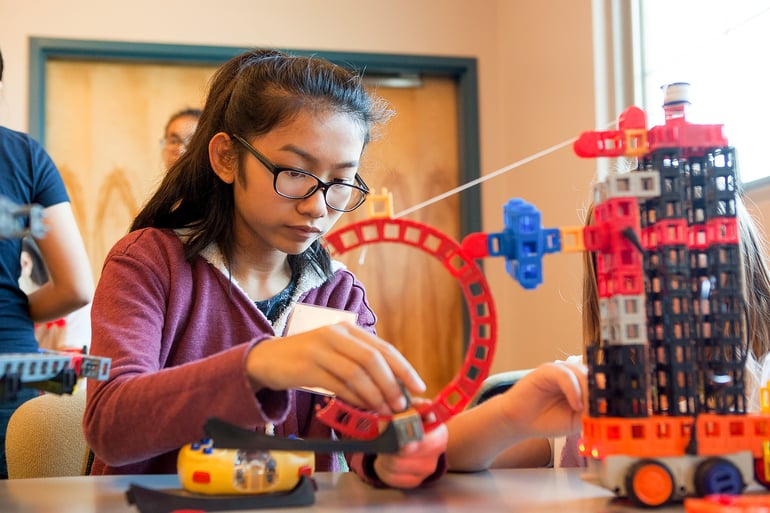
We all learned the scientific method in school, and you may still have a few preconceived ideas about it because of your experience. Maybe you remember it as a structured approach used for science fair projects or lab experiments. This rigid view that’s applied in science class is not applicable to everyday life. But the scientific method shouldn’t be seen as inflexible or exclusive to the science classroom. In fact, you use the scientific method every day. Think of it as a logical process for solving a problem and gaining knowledge.
Everyday scientific thinking
Think back to this morning. Most people start their day by drinking coffee. Was your coffee hot? You made an observation. Did you wonder if it was too hot for you to drink yet? You asked a question. Based on your experience drinking coffee, you may have formed a hypothesis and decided if it was too hot for you to drink based on how long it had been since you poured it. Did you touch the cup or move your hand over the top to feel the warmth? You conducted an experiment. After testing the heat, you probably analyzed the data to conclude if the coffee was too hot to drink.
In deciding when your coffee was ready to drink, you naturally used the scientific method. You thought about the content of science, used reasoning processes to solve a problem, and applied your findings. In this case, hopefully you didn’t burn your tongue!
Actually, you've been naturally applying scientific thinking to everyday decisions since you were a child. Do you remember crying to get your parents’ attention? That process allowed you to predict, verify, or refute a hypothesis. Crying most likely got their attention, so you applied your new-found knowledge to improve your world.
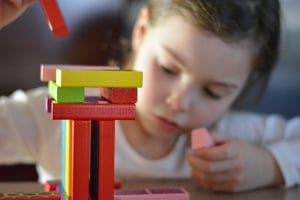
But you most likely did not do this once, in a step-by-step order. Maybe your hypothesis was wrong, and your coffee was too hot. Did you consider your experiment? If you burned your tongue even after touching the cup or moving your hand over the top, you probably brainstormed another method to test the coffee before you risked burning your tongue again. If your coffee was too hot to drink after your first test, I’m sure you tested it again instead of giving up and not having coffee at all. And what if you waited too long and the coffee was too cold? That created a new problem with possible solutions. If you are an avid coffee drinker, you have probably mastered this process through multiple attempts, but still circle around this process instinctually.
Scientific thinking in the 21st century classroom
This same scientific thinking can apply to the everyday 21st century classroom by teaching children to solve more significant everyday problems. Although it is still important to teach the step-by-step approach to the scientific method, including the terminology and definitions, it can be experienced in a less formal way that incorporates 21st century skills. These skills can include critical thinking, creativity, and collaboration, that help students generate new knowledge and collaborate to solve problems that are relevant to them. By teaching young children the basic approach first, you can scaffold their learning and move on to more innovative approaches to scientific thinking by having children design their own investigations to solve problems using the scientific method as a guide.
Steps of the scientific method
First, teach or review the steps of the scientific method with your students. By using real world examples, students can see how scientific thinking isn’t exclusive to science class. They can also relate to the process and apply their thinking to larger problems. It’s unlikely that your students drank coffee this morning, but maybe their cereal was soggy, their shoes wouldn’t stay tied, or the class is experiencing a problem. Take them through the steps of the scientific method as they recall the challenge at hand.
- Make an observation: What do you see around you that causes a problem?
- Ask a question: What causes this problem?
- Form a hypothesis: What is a potential answer to the question that can be tested?
- Make a prediction: What outcome do you expect if the hypothesis is correct?
- Test the hypothesis: Perform an experiment.
- Analyze the results: What does your data show?
- Reflect and draw conclusions: Discuss your results to see if your hypothesis was correct. If not, why? Can you repeat the experiment?
Incorporating scientific thinking in the 21st century classroom
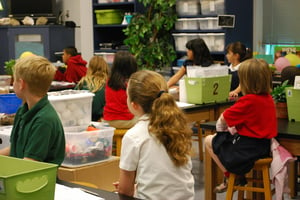
Project-based learning incorporates these skills by using critical thinking, creativity, collaboration, and communication ( the 4 Cs ). By working together to solve a problem, students learn social and leadership skills. Solving problems also encourages students to take initiative, be productive, and flexible. By researching solutions to a problem, students develop information literacy, media literacy, and technology literacy.
We all run into problems in our everyday lives. If we take the time to understand the root of the problems and why they occur, we can easily brainstorm solutions. That’s critical thinking! Help your students make this connection by asking them to reflect on problems in their community.
Maybe your students have noticed that there is litter around the school. Are there enough trash cans? Does the school have a recycling program? Maybe your students notice that the carpool process is slow. Are there crossing guards? Is someone directing traffic? These real world problems are relatable to students, and realistically solvable. There are also multiple approaches to solving the problems that involve creativity and innovation.
Solving a problem with 21st century skills
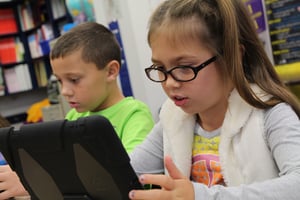
Bringing the scientific method to life
By showing students that scientific thinking is natural and applicable to everyday life, you can bring the scientific method to life outside of the science classroom. Children learn best by doing, and relating learning to their lives. By guiding students to solve problems in their community, you will help them develop 21st century skills through innovation and scientific thinking.
Topics: STEM Activities , Preschool , Elementary STEM Education , STEM Education
Written By Chelsea Herndon
Chelsea Herndon earned a Master of Arts in Early Childhood Education and Elementary Education and an Educational Specialist in Elementary Education from the University of Alabama at Birmingham. She is currently an instructor and doctoral student at Auburn University.
Would you like to receive more information about starting a Kid Spark STEM program for your students?
Go beyond the buzzword with kid spark..
At Kid Spark Education, STEM isn't a buzzword: it's a powerful way to nurture students' natural curiosity; build confidence and skills in science, technology, engineering, and math; and foster abilities in collaboration, problem-solving, and communication. You, their teachers, are our most important partner in achieving our mission of preparing all children for a lifetime of learning about science and technology. The Kid Spark Blog is written by educators, for educators to be a resource in your toolbox so you can feel confident and capable in teaching STEM to your elementary students.
Recent Posts
Post by topics.
- Elementary STEM Education (31)
- STEM Education (30)
- STEM Activities (26)
- Kid Spark Education (10)
- STEM kits (9)
- middle school stem (9)
- STEM mentors (8)
- stem programs (8)
- Preschool (7)
- curriculum (7)
- Professional Development (6)
- elementary (6)
- middle school (6)
- stem and early childhood (6)
- STEM classroom kit (5)
- elementary school (5)
- resources (5)
- 5th grade (4)
- elementary schools (4)
- funding (4)
- learning experiences (4)
- science (4)
- 1st Grade (3)
- 2nd Grade (3)
- 6th grade (3)
- STEM Challenges (3)
- administration (3)
- early childhood (3)
- engineering (3)
- integrating curriculum (3)
- kindergarten (3)
- learning labs (3)
- robotics (3)
- 3d printing (2)
- STEM Identity (2)
- after school stem (2)
- afterschool (2)
- implementation (2)
- mobile stem labs (2)
- reading (2)
- stem math curriculum (2)
- After School (1)
- Computer Science (1)
- best of (1)
- education (1)
- learning (1)
- stem enrichment (1)

What is Science for Kids? A Fun and Simple Explanation
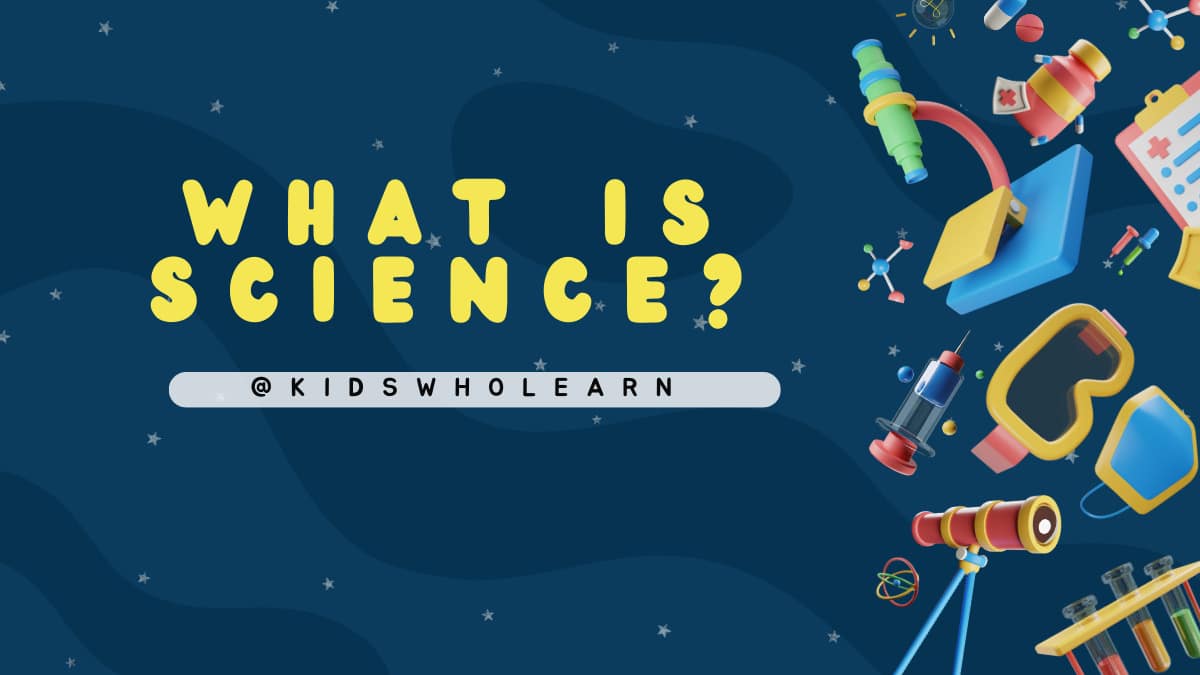
Science is a fascinating subject that offers endless opportunities for exploration and discovery. Your child may have wondered what science is and how it works. Simply put, science is the study of the natural world and everything in it. It involves observing, asking questions, making predictions, and testing those predictions through experimentation.
Science is all around us, from the plants and animals in our backyard to the stars in the sky. It helps us understand the world we live in and find solutions to problems. Science is a way of thinking and a process of discovery that can be used to answer questions and solve problems in many different fields, from medicine to engineering to environmental science.
Learning about science can be fun and exciting, as you get to explore and discover new things. By understanding the basics of science, you can start to ask questions and make observations about the world around you. So, what is science for kids? It’s a way to explore and understand the world, and it’s a whole lot of fun!
Understanding Science
What is science.
Science is a way of learning about the world around us. It involves asking questions, making observations, and conducting experiments to find answers. Scientists use the scientific method to help them understand how things work. The scientific method involves making observations, asking questions, forming hypotheses, testing those hypotheses, and drawing conclusions based on the results.
Science covers a wide range of subjects, including biology, chemistry, physics, and earth science. Each of these subjects involves studying different aspects of the natural world, from the smallest particles to the largest galaxies.
Why is Science Important?
Science is important because it helps us understand the world around us. It allows us to answer questions about how things work and why they behave the way they do. Science has led to many important discoveries and advancements, from the development of vaccines to the exploration of space.
Science also helps us solve problems. It allows us to develop new technologies and find solutions to challenges facing our planet, such as climate change and pollution. By studying science, we can make informed decisions about important issues that affect our lives and the world we live in.
In summary, science is a way of learning about the world through observation, experimentation, and analysis. It is important because it helps us understand the world around us and find solutions to important problems.
Branches of Science
Science is a vast subject that is divided into three main branches: Physical Sciences, Life Sciences, and Earth Sciences. Each branch focuses on different aspects of the world around us.
Physical Sciences
Physical Sciences deal with the study of non-living things. This branch of science includes subjects like Physics, Chemistry, and Astronomy. Physics deals with the study of matter, energy, and their interactions. Chemistry deals with the study of the properties, composition, and behavior of matter. Astronomy deals with the study of celestial objects like stars, planets, and galaxies.
Life Sciences
Life Sciences deal with the study of living things. This branch of science includes subjects like Biology, Zoology, and Botany. Biology deals with the study of living organisms, including their structure, function, and evolution. Zoology deals with the study of animals, while Botany deals with the study of plants.
Earth Sciences
Earth Sciences deal with the study of the Earth and its processes. This branch of science includes subjects like Geology, Meteorology, and Oceanography. Geology deals with the study of the Earth’s structure, composition, and history. Meteorology deals with the study of weather and climate. Oceanography deals with the study of the oceans, including their physical and biological properties.
In conclusion, understanding the different branches of science can help you appreciate the complexity and diversity of the world we live in. By studying these different branches, you can gain a deeper understanding of the world around you and how it works.
Science in Everyday Life
Science is not something that only happens in a laboratory or classroom. Science is all around you, in everything you do and see. Here are a few examples of how science is a part of your everyday life:
Food Science
Have you ever wondered why bread rises or why fruit turns brown? These are all examples of food science. Food science helps us understand how to store and prepare food safely, and how to make it taste good. Scientists use chemistry and biology to study food and make sure it is safe to eat.
Technology is everywhere in our lives, from the phones we use to the cars we drive. Technology is the application of science to solve problems and make our lives easier. For example, engineers use science to design and build bridges, buildings, and other structures.
Weather is a part of our everyday lives, and scientists study it to help us understand and predict it. Meteorologists use science to study the atmosphere and predict weather patterns. They use tools like radar and satellites to track storms and other weather events.
Science is also important for our health. Doctors and nurses use science to diagnose and treat illnesses. Scientists study the human body to understand how it works and how to keep it healthy. They also develop new medicines and treatments to help people who are sick.
In conclusion, science is all around us, in everything we do and see. From the food we eat to the technology we use, science helps us understand and improve our world.
Fun Science Experiments
Science can be fun and exciting, especially when you get to do experiments! Here are some simple experiments you can try at home or use for your next science fair project.
Simple Experiments at Home
- Baking Soda and Vinegar Volcano – This classic experiment is always a hit with kids. Mix baking soda and vinegar together and watch as it erupts like a volcano. You can add food coloring to make it more colorful.
- Walking Water – This experiment is easy and visually stunning. Fill three clear cups with water and add food coloring to two of them. Then, place a paper towel between the cups and watch as the water “walks” up the paper towel and into the empty cup.
- Invisible Ink – Use lemon juice to write secret messages on paper. When the paper dries, the message will be invisible. To reveal the message, hold the paper over a heat source, like a light bulb.
Science Fair Project Ideas
- Which Fruit Conducts Electricity the Best? – Use a circuit tester to test which fruit conducts electricity the best. Cut slices of different fruits and place them between the circuit tester’s probes to see which fruit lights up the bulb the brightest.
- How Does Temperature Affect the Rate of Plant Growth? – Plant two of the same type of plant in separate pots. Place one pot in a warm area and the other in a cool area. Measure and record the growth of each plant over time to see how temperature affects growth.
- Which Brand of Popcorn Pops the Most Kernels? – Pop kernels from different brands of popcorn and count how many kernels pop. Record your results and see which brand pops the most kernels.
Science is all around us and experimenting is a great way to learn more about it. Have fun and be curious!
Famous Scientists and Their Contributions
Learning about famous scientists and their contributions can help you understand how science has evolved over time. Here are a few famous scientists and their contributions to science:
Albert Einstein
Albert Einstein was a physicist who is best known for his theory of relativity. This theory explains how time and space are related and how gravity works. Einstein also made significant contributions to the development of the atomic bomb during World War II.
Marie Curie
Marie Curie was a physicist and chemist who is best known for her work on radioactivity. She discovered two new elements, polonium and radium, and was the first woman to win a Nobel Prize in Physics.
Charles Darwin
Charles Darwin was a naturalist who is best known for his theory of evolution. He proposed that species evolve over time through a process called natural selection. This theory has had a significant impact on the field of biology.
Isaac Newton
Isaac Newton was a mathematician and physicist who is best known for his laws of motion and universal gravitation. His laws of motion explain how objects move and interact with each other, while his law of universal gravitation explains how gravity works.
Learning about these famous scientists and their contributions can help you appreciate the importance of science in our world today.
Science is all around us, and it helps us understand the world we live in. By asking questions, making observations, and conducting experiments, scientists learn new things every day. As a kid, you can also be a scientist by exploring the world around you and asking questions.
Remember, science is not just about memorizing facts. It’s about understanding how things work and discovering new things. You can use science to solve problems, create new things, and make the world a better place.
Here are some important things to keep in mind when learning about science:
- Science is based on evidence, not opinions or beliefs.
- Scientists use the scientific method to ask questions, make observations, and conduct experiments.
- Science is always changing as new discoveries are made.
- Science can be used to solve problems and make the world a better place.
So go out there and explore the world around you! Who knows, you might just discover something new and exciting.
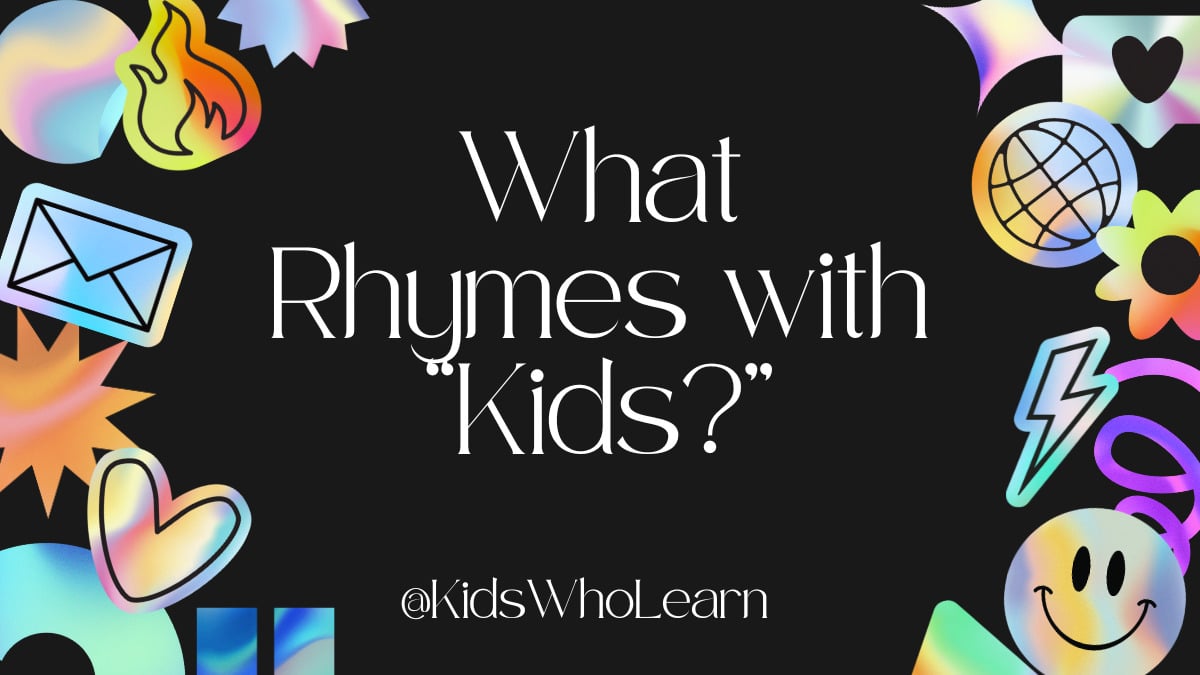
Kids Who Learn
You may also like.
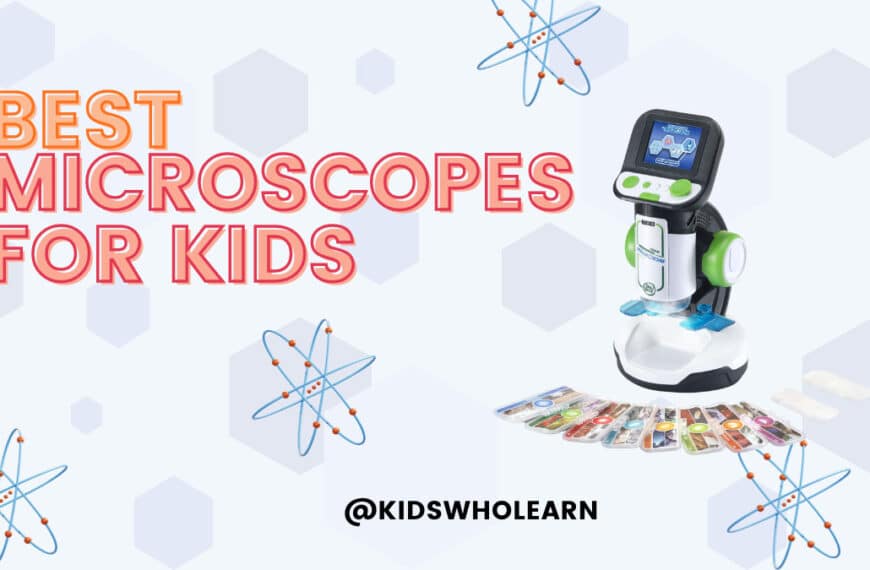
The Best Microscopes for Kids: 8 Picks For Future Scientists
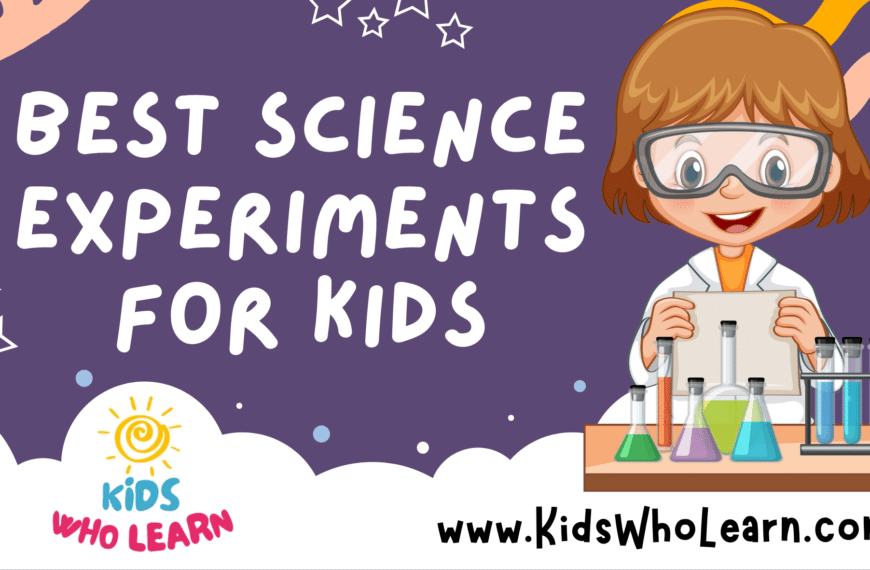
The Best Science Experiments for Kids: for Young Scientists

The Best Dinosaur Books for Kids: Young Paleontologists
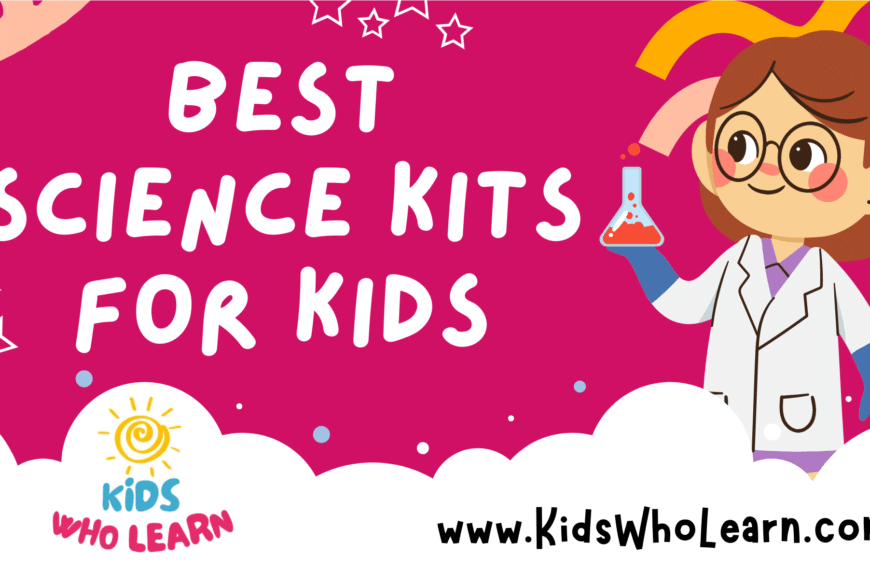
The Best Science Kits for Kids: Top Educational Picks
Leave a reply cancel reply.
Your email address will not be published. Required fields are marked *
Save my name, email, and website in this browser for the next time I comment.
Join Our Newsletter!
Hey there, Awesome Parents and Curious Kids! 🌟 Ready to dive into a world of fun, learning, and excitement? Join our KidsWhoLearn Newsletter! Subscribe to our newsletter and get a weekly dose of joy, including:
- 🎨 Creative Crafts and DIYs
- 📚 Exciting Learning Tips & Resources
- 🍎 Healthy Snacks and Fun Recipes
- 🎉 Monthly Giveaways and Surprises!
Plus, a special welcome gift awaits! 🎁
- Maths Notes Class 12
- NCERT Solutions Class 12
- RD Sharma Solutions Class 12
- Maths Formulas Class 12
- Maths Previous Year Paper Class 12
- Class 12 Syllabus
- Class 12 Revision Notes
- Physics Notes Class 12
- Chemistry Notes Class 12
- Biology Notes Class 12
- Null Hypothesis
- Hypothesis Testing Formula
- Difference Between Hypothesis And Theory
- Real-life Applications of Hypothesis Testing
- Permutation Hypothesis Test in R Programming
- Bayes' Theorem
- How do you define and measure your product hypothesis?
- How to Perform an F-Test in Python
- How to Perform a Kruskal-Wallis Test in Python
- Type II Error in Hypothesis Testing with R Programming
- Multiplication Theorem
- How to Perform the Nemenyi Test in Python
- Hypothesis in Machine Learning
- Current Best Hypothesis Search
- Understanding Hypothesis Testing
- Hypothesis Testing in R Programming
- Jobathon | Stats | Question 10
- Jobathon | Stats | Question 17
- Testing | Question 1
- Difference between Null and Alternate Hypothesis
- ML | Find S Algorithm
- Python - Pearson's Chi-Square Test
- Arithmetic Mean
- MuSigma Aptitude Test - Round I
- Aptitude | Syllogism | Question 1
Hypothesis is a testable statement that explains what is happening or observed. It proposes the relation between the various participating variables. Hypothesis is also called Theory, Thesis, Guess, Assumption, or Suggestion. Hypothesis creates a structure that guides the search for knowledge.
In this article, we will learn what is hypothesis, its characteristics, types, and examples. We will also learn how hypothesis helps in scientific research.

What is Hypothesis?
A hypothesis is a suggested idea or plan that has little proof, meant to lead to more study. It’s mainly a smart guess or suggested answer to a problem that can be checked through study and trial. In science work, we make guesses called hypotheses to try and figure out what will happen in tests or watching. These are not sure things but rather ideas that can be proved or disproved based on real-life proofs. A good theory is clear and can be tested and found wrong if the proof doesn’t support it.
Hypothesis Meaning
A hypothesis is a proposed statement that is testable and is given for something that happens or observed.
- It is made using what we already know and have seen, and it’s the basis for scientific research.
- A clear guess tells us what we think will happen in an experiment or study.
- It’s a testable clue that can be proven true or wrong with real-life facts and checking it out carefully.
- It usually looks like a “if-then” rule, showing the expected cause and effect relationship between what’s being studied.
Characteristics of Hypothesis
Here are some key characteristics of a hypothesis:
- Testable: An idea (hypothesis) should be made so it can be tested and proven true through doing experiments or watching. It should show a clear connection between things.
- Specific: It needs to be easy and on target, talking about a certain part or connection between things in a study.
- Falsifiable: A good guess should be able to show it’s wrong. This means there must be a chance for proof or seeing something that goes against the guess.
- Logical and Rational: It should be based on things we know now or have seen, giving a reasonable reason that fits with what we already know.
- Predictive: A guess often tells what to expect from an experiment or observation. It gives a guide for what someone might see if the guess is right.
- Concise: It should be short and clear, showing the suggested link or explanation simply without extra confusion.
- Grounded in Research: A guess is usually made from before studies, ideas or watching things. It comes from a deep understanding of what is already known in that area.
- Flexible: A guess helps in the research but it needs to change or fix when new information comes up.
- Relevant: It should be related to the question or problem being studied, helping to direct what the research is about.
- Empirical: Hypotheses come from observations and can be tested using methods based on real-world experiences.
Sources of Hypothesis
Hypotheses can come from different places based on what you’re studying and the kind of research. Here are some common sources from which hypotheses may originate:
- Existing Theories: Often, guesses come from well-known science ideas. These ideas may show connections between things or occurrences that scientists can look into more.
- Observation and Experience: Watching something happen or having personal experiences can lead to guesses. We notice odd things or repeat events in everyday life and experiments. This can make us think of guesses called hypotheses.
- Previous Research: Using old studies or discoveries can help come up with new ideas. Scientists might try to expand or question current findings, making guesses that further study old results.
- Literature Review: Looking at books and research in a subject can help make guesses. Noticing missing parts or mismatches in previous studies might make researchers think up guesses to deal with these spots.
- Problem Statement or Research Question: Often, ideas come from questions or problems in the study. Making clear what needs to be looked into can help create ideas that tackle certain parts of the issue.
- Analogies or Comparisons: Making comparisons between similar things or finding connections from related areas can lead to theories. Understanding from other fields could create new guesses in a different situation.
- Hunches and Speculation: Sometimes, scientists might get a gut feeling or make guesses that help create ideas to test. Though these may not have proof at first, they can be a beginning for looking deeper.
- Technology and Innovations: New technology or tools might make guesses by letting us look at things that were hard to study before.
- Personal Interest and Curiosity: People’s curiosity and personal interests in a topic can help create guesses. Scientists could make guesses based on their own likes or love for a subject.
Types of Hypothesis
Here are some common types of hypotheses:
Simple Hypothesis
Complex hypothesis, directional hypothesis.
- Non-directional Hypothesis
Null Hypothesis (H0)
Alternative hypothesis (h1 or ha), statistical hypothesis, research hypothesis, associative hypothesis, causal hypothesis.
Simple Hypothesis guesses a connection between two things. It says that there is a connection or difference between variables, but it doesn’t tell us which way the relationship goes.
Complex Hypothesis tells us what will happen when more than two things are connected. It looks at how different things interact and may be linked together.
Directional Hypothesis says how one thing is related to another. For example, it guesses that one thing will help or hurt another thing.
Non-Directional Hypothesis
Non-Directional Hypothesis are the one that don’t say how the relationship between things will be. They just say that there is a connection, without telling which way it goes.
Null hypothesis is a statement that says there’s no connection or difference between different things. It implies that any seen impacts are because of luck or random changes in the information.
Alternative Hypothesis is different from the null hypothesis and shows that there’s a big connection or gap between variables. Scientists want to say no to the null hypothesis and choose the alternative one.
Statistical Hypotheis are used in math testing and include making ideas about what groups or bits of them look like. You aim to get information or test certain things using these top-level, common words only.
Research Hypothesis comes from the research question and tells what link is expected between things or factors. It leads the study and chooses where to look more closely.
Associative Hypotheis guesses that there is a link or connection between things without really saying it caused them. It means that when one thing changes, it is connected to another thing changing.
Causal Hypothesis are different from other ideas because they say that one thing causes another. This means there’s a cause and effect relationship between variables involved in the situation. They say that when one thing changes, it directly makes another thing change.
Hypothesis Examples
Following are the examples of hypotheses based on their types:
Simple Hypothesis Example
- Studying more can help you do better on tests.
- Getting more sun makes people have higher amounts of vitamin D.
Complex Hypothesis Example
- How rich you are, how easy it is to get education and healthcare greatly affects the number of years people live.
- A new medicine’s success relies on the amount used, how old a person is who takes it and their genes.
Directional Hypothesis Example
- Drinking more sweet drinks is linked to a higher body weight score.
- Too much stress makes people less productive at work.
Non-directional Hypothesis Example
- Drinking caffeine can affect how well you sleep.
- People often like different kinds of music based on their gender.
- The average test scores of Group A and Group B are not much different.
- There is no connection between using a certain fertilizer and how much it helps crops grow.
Alternative Hypothesis (Ha)
- Patients on Diet A have much different cholesterol levels than those following Diet B.
- Exposure to a certain type of light can change how plants grow compared to normal sunlight.
- The average smarts score of kids in a certain school area is 100.
- The usual time it takes to finish a job using Method A is the same as with Method B.
- Having more kids go to early learning classes helps them do better in school when they get older.
- Using specific ways of talking affects how much customers get involved in marketing activities.
- Regular exercise helps to lower the chances of heart disease.
- Going to school more can help people make more money.
- Playing violent video games makes teens more likely to act aggressively.
- Less clean air directly impacts breathing health in city populations.
Functions of Hypothesis
Hypotheses have many important jobs in the process of scientific research. Here are the key functions of hypotheses:
- Guiding Research: Hypotheses give a clear and exact way for research. They act like guides, showing the predicted connections or results that scientists want to study.
- Formulating Research Questions: Research questions often create guesses. They assist in changing big questions into particular, checkable things. They guide what the study should be focused on.
- Setting Clear Objectives: Hypotheses set the goals of a study by saying what connections between variables should be found. They set the targets that scientists try to reach with their studies.
- Testing Predictions: Theories guess what will happen in experiments or observations. By doing tests in a planned way, scientists can check if what they see matches the guesses made by their ideas.
- Providing Structure: Theories give structure to the study process by arranging thoughts and ideas. They aid scientists in thinking about connections between things and plan experiments to match.
- Focusing Investigations: Hypotheses help scientists focus on certain parts of their study question by clearly saying what they expect links or results to be. This focus makes the study work better.
- Facilitating Communication: Theories help scientists talk to each other effectively. Clearly made guesses help scientists to tell others what they plan, how they will do it and the results expected. This explains things well with colleagues in a wide range of audiences.
- Generating Testable Statements: A good guess can be checked, which means it can be looked at carefully or tested by doing experiments. This feature makes sure that guesses add to the real information used in science knowledge.
- Promoting Objectivity: Guesses give a clear reason for study that helps guide the process while reducing personal bias. They motivate scientists to use facts and data as proofs or disprovals for their proposed answers.
- Driving Scientific Progress: Making, trying out and adjusting ideas is a cycle. Even if a guess is proven right or wrong, the information learned helps to grow knowledge in one specific area.
How Hypothesis help in Scientific Research?
Researchers use hypotheses to put down their thoughts directing how the experiment would take place. Following are the steps that are involved in the scientific method:
- Initiating Investigations: Hypotheses are the beginning of science research. They come from watching, knowing what’s already known or asking questions. This makes scientists make certain explanations that need to be checked with tests.
- Formulating Research Questions: Ideas usually come from bigger questions in study. They help scientists make these questions more exact and testable, guiding the study’s main point.
- Setting Clear Objectives: Hypotheses set the goals of a study by stating what we think will happen between different things. They set the goals that scientists want to reach by doing their studies.
- Designing Experiments and Studies: Assumptions help plan experiments and watchful studies. They assist scientists in knowing what factors to measure, the techniques they will use and gather data for a proposed reason.
- Testing Predictions: Ideas guess what will happen in experiments or observations. By checking these guesses carefully, scientists can see if the seen results match up with what was predicted in each hypothesis.
- Analysis and Interpretation of Data: Hypotheses give us a way to study and make sense of information. Researchers look at what they found and see if it matches the guesses made in their theories. They decide if the proof backs up or disagrees with these suggested reasons why things are happening as expected.
- Encouraging Objectivity: Hypotheses help make things fair by making sure scientists use facts and information to either agree or disagree with their suggested reasons. They lessen personal preferences by needing proof from experience.
- Iterative Process: People either agree or disagree with guesses, but they still help the ongoing process of science. Findings from testing ideas make us ask new questions, improve those ideas and do more tests. It keeps going on in the work of science to keep learning things.
People Also View:
Mathematics Maths Formulas Branches of Mathematics
Summary – Hypothesis
A hypothesis is a testable statement serving as an initial explanation for phenomena, based on observations, theories, or existing knowledge. It acts as a guiding light for scientific research, proposing potential relationships between variables that can be empirically tested through experiments and observations. The hypothesis must be specific, testable, falsifiable, and grounded in prior research or observation, laying out a predictive, if-then scenario that details a cause-and-effect relationship. It originates from various sources including existing theories, observations, previous research, and even personal curiosity, leading to different types, such as simple, complex, directional, non-directional, null, and alternative hypotheses, each serving distinct roles in research methodology. The hypothesis not only guides the research process by shaping objectives and designing experiments but also facilitates objective analysis and interpretation of data, ultimately driving scientific progress through a cycle of testing, validation, and refinement.
FAQs on Hypothesis
What is a hypothesis.
A guess is a possible explanation or forecast that can be checked by doing research and experiments.
What are Components of a Hypothesis?
The components of a Hypothesis are Independent Variable, Dependent Variable, Relationship between Variables, Directionality etc.
What makes a Good Hypothesis?
Testability, Falsifiability, Clarity and Precision, Relevance are some parameters that makes a Good Hypothesis
Can a Hypothesis be Proven True?
You cannot prove conclusively that most hypotheses are true because it’s generally impossible to examine all possible cases for exceptions that would disprove them.
How are Hypotheses Tested?
Hypothesis testing is used to assess the plausibility of a hypothesis by using sample data
Can Hypotheses change during Research?
Yes, you can change or improve your ideas based on new information discovered during the research process.
What is the Role of a Hypothesis in Scientific Research?
Hypotheses are used to support scientific research and bring about advancements in knowledge.
Please Login to comment...
Similar reads.

- Geeks Premier League 2023
- Maths-Class-12
- Geeks Premier League
- Mathematics
- School Learning

Improve your Coding Skills with Practice
What kind of Experience do you want to share?
- Dictionaries home
- American English
- Collocations
- German-English
- Grammar home
- Practical English Usage
- Learn & Practise Grammar (Beta)
- Word Lists home
- My Word Lists
- Recent additions
- Resources home
- Text Checker
Definition of hypothesis noun from the Oxford Advanced American Dictionary
- formulate/advance a theory/hypothesis
- build/construct/create/develop a simple/theoretical/mathematical model
- develop/establish/provide/use a theoretical/conceptual framework/an algorithm
- advance/argue/develop the thesis that…
- explore an idea/a concept/a hypothesis
- make a prediction/an inference
- base a prediction/your calculations on something
- investigate/evaluate/accept/challenge/reject a theory/hypothesis/model
- design an experiment/a questionnaire/a study/a test
- do research/an experiment/an analysis
- make observations/calculations
- take/record measurements
- carry out/conduct/perform an experiment/a test/a longitudinal study/observations/clinical trials
- run an experiment/a simulation/clinical trials
- repeat an experiment/a test/an analysis
- replicate a study/the results/the findings
- observe/study/examine/investigate/assess a pattern/a process/a behavior
- fund/support the research/project/study
- seek/provide/get/secure funding for research
- collect/gather/extract data/information
- yield data/evidence/similar findings/the same results
- analyze/examine the data/soil samples/a specimen
- consider/compare/interpret the results/findings
- fit the data/model
- confirm/support/verify a prediction/a hypothesis/the results/the findings
- prove a conjecture/hypothesis/theorem
- draw/make/reach the same conclusions
- read/review the records/literature
- describe/report an experiment/a study
- present/publish/summarize the results/findings
- present/publish/read/review/cite a paper in a scientific journal
Want to learn more?
Find out which words work together and produce more natural-sounding English with the Oxford Collocations Dictionary app. Try it for free as part of the Oxford Advanced Learner’s Dictionary app.

In statistics , a null hypothesis is what you expect to happen before you run an experiment. The idea is that if the results don't reject the null hypothesis, then you aren't finding anything new or surprising. The most common null hypothesis is the "no-change" or "no-difference" hypothesis . For example, if you're testing whether a thing works, and starting with the null hypothesis that it won't work. The term was first used by Ronald Fisher in his book The design of experiments .
Every experiment has a null hypothesis.
- If you do an experiment to see if a medicine works, the null hypothesis is that it doesn't work.
- If you do an experiment to see if people like chocolate or vanilla ice cream better, the null hypothesis is that people like them equally.
- If you do an experiment to see if either boys or girls can play piano better, the null hypothesis is that boys and girls are equally good at playing the piano.
The opposite of a null hypothesis is an alternative hypothesis . Some examples of alternative hypotheses are:
- This medicine makes people healthier.
- People like chocolate ice cream better than vanilla.
- Girls are better at playing the piano than boys.
- This page was last modified on 16 October 2023, at 16:53. Suggest an edit .

IMAGES
VIDEO
COMMENTS
Follow this easy formula to write a strong hypothesis: If (I do this), then (this will happen). We call this an if - then statement. Here are some examples of an if - then statement: If I use ...
A hypothesis is an idea about how something works that can be tested using experiments. A prediction says what will happen in an experiment if the hypothesis is correct. Presenter 1: We are going ...
For a good science fair project you need to do quite a bit of research before any experimenting. Start by finding some information about how and why water melts. You could read a book, do a bit of Google searching, or even ask an expert. For our example, you could learn about how temperature and air pressure can change the state of water.
A scientific hypothesis is a tentative, testable explanation for a phenomenon in the natural world. It's the initial building block in the scientific method. Many describe it as an "educated guess ...
STEP 3: Develop A Prediction or Hypothesis. You have made your observations, you have your question, and now you need to make a prediction about what you think will happen. A prediction is a guess at what might happen in an experiment based on observation or other information. A hypothesis is not simply a guess!
hypothesis: [noun] an assumption or concession made for the sake of argument. an interpretation of a practical situation or condition taken as the ground for action.
hypothesis, something supposed or taken for granted, with the object of following out its consequences (Greek hypothesis, "a putting under," the Latin equivalent being suppositio ). Discussion with Kara Rogers of how the scientific model is used to test a hypothesis or represent a theory. Kara Rogers, senior biomedical sciences editor of ...
In fact, science can be viewed as a scrutinizing system of logic. It seeks to answer questions by observing phenomena. As scientists try to solve a problem, they may use a model based on a logical, plausible connection of events. Like a hypothesis, the model is then tested by making predictions based on the model.
A Hypothesis is a Well Thoughtout Prediction. Yes, asking groups of kids to guess what will happen can be fun. But, expecting a hypothesis for every experiment defeats the purpose for this science process skill. A hypothesis relys on observations that have been previously made. Hypothesis are often called "educated" guesses.
Hypothesis is a prediction of the outcome of a study. Hypotheses are drawn from theories and research questions or from direct observations. In fact, a research problem can be formulated as a hypothesis. To test the hypothesis we need to formulate it in terms that can actually be analysed with statistical tools.
Scientific Thinking for Kids. We all learned the scientific method in school, and you may still have a few preconceived ideas about it because of your experience. Maybe you remember it as a structured approach used for science fair projects or lab experiments. This rigid view that's applied in science class is not applicable to everyday life.
Spread the love. Science is a fascinating subject that offers endless opportunities for exploration and discovery. Your child may have wondered what science is and how it works. Simply put, science is the study of the natural world and everything in it. It involves observing, asking questions, making predictions, and testing those predictions ...
Hypothesis. Hypothesis is a testable statement that explains what is happening or observed. It proposes the relation between the various participating variables. Hypothesis is also called Theory, Thesis, Guess, Assumption, or Suggestion. Hypothesis creates a structure that guides the search for knowledge.
The scientific method involves observations, hypotheses, predictions, and experiments. In all the branches of life science, the scientific method is used to make discoveries and add to mankind's understanding of the universe. There are a number of stages of the scientific method: 1. Observation: 'It gets cold in winter!'.
Scientific evidence is evidence that serves to either support or counter a scientific theory or hypothesis, although scientists also use evidence in other ways, such as when applying theories to practical problems. Such evidence is expected to be empirical evidence and interpretable in accordance with the scientific method.Standards for scientific evidence vary according to the field of ...
1 [countable] an idea or explanation of something that is based on a few known facts but that has not yet been proved to be true or correct synonym theory to formulate/confirm a hypothesis a hypothesis about the function of dreams There is little evidence to support these hypotheses. Topic Collocations Scientific Research theory. formulate/advance a theory/hypothesis
Kids Encyclopedia Facts. Ronald Fisher. In statistics, a null hypothesis is what you expect to happen before you run an experiment. The idea is that if the results don't reject the null hypothesis, then you aren't finding anything new or surprising. The most common null hypothesis is the "no-change" or "no-difference" hypothesis.